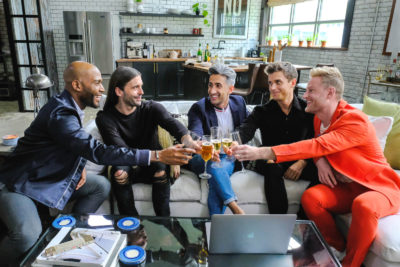
“Twenty Gay-Teen” is becoming a popular term among millennials to describe social progress many hope to see this year. “Queer Eye,” a new Netflix series that premiered on Feb. 7, is an important step toward a successful twenty gay-teen.
The show stars five LGBT men, referred to as “The Fab Five,” who travel around Georgia giving other men makeovers. Each man specializes in a field (design, food and wine, culture, fashion, grooming) and their goal is to reinvigorate men who may have lost their way.
On first glance, “Queer Eye,” which is based on the Emmy-winning Bravo series “Queer Eye for the Straight Guy” that ran from 2003-2007, looks like another bland makeover reality show. But after the first episode, it becomes obvious that this series is about more than just changing somebody’s outward appearance.
As resident fashion expert Tan France says, “The original show is about tolerance. Our fight is for acceptance.” This idea rings true for every man lucky enough to be entertained by the Fab Five, as the show isn’t just about accepting LGBT people, it’s also about loving yourself.
The show’s creator, David Collins, did a great job of bringing together a colorful cast of characters who exemplify the LGBT community. By bringing together a diverse group of men, “Queer Eye” shows audiences that there’s no right or wrong way to be queer.
Similarly, the men receiving makeovers are diverse. In just eight episodes, they makeover young men, old men, straight men, men of color, single men, gay men, married men — all sorts of men — unlike the original show, which focused exclusively on straight men.
“Queer Eye” is based in the South, and certain conflicts cannot be avoided when show’s hosts are a group of five gay men, two of whom are people of color. Nevertheless, all of the conflicts are handled with grace when they appear in the show.
Karamo Brown, culture expert, has a conversation with a police officer over the rising tensions concerning the use of excess violence and profiling of African-Americans by cops. The moment is a tense but necessary part of what the show is trying to do, breaking down stereotypes and making a social impact on lives the Fab Five touch.
Another stirring exchange occurs between Bobby Berk, design expert, and a steadfast Christian dad. Bobby shares stories from his childhood, recounting how he was raised Christian but felt alienated because he knew he was gay. In the face of such adversity, he overcame, but still has some religious reservations.
The dad, whose name just happened to also be Bobby, shares that he does not believe in loving people less because of their sexuality. He recognizes that in many church communities, members of the LGBT community are not supported, but he says that in his house “they have been loved.”
While “Queer Eye” doesn’t pressure conversations about hot-button issues, it doesn’t shy away from them. Rather, it opens the floor to a bigger discussion about what it really means to understand someone and what they are going through.
The theme of “Queer Eye” really does revolve around the idea of communication and self-care. The goal for each episode is to teach a man how to take care of himself physically and emotionally. The Fab Five try to give other men the gift of confidence, and each man walks away from the experience feeling like they have learned something about self-love.
Personally, watching the show made me feel a bit more confident. It’s almost impossible not to feel joy as you watch these men love and care for strangers. “Queer Eye” is a wholesome, feel-good show that will leave you wanting to take better care of yourself and others.




















































































































Juan Lopez • Mar 4, 2018 at 9:07 pm
Hey,
I just signed the petition “Reed Hastings: Remove Karamo from Queer Eye” and wanted to see if you could help by adding your name.
Our goal is to reach 100 signatures and we need more support. You can read more and sign the petition here:
http://chn.ge/2oHjkp0